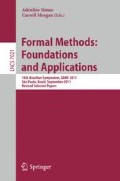Abstract
In the development of critical systems it is common practice to make use of redundancy in order to achieve higher levels of reliability. There are well established design patterns that introduce redundancy and that are widely documented and adopted by the industry. However there have been few attempts to formally verify some of them. In this work we modelled three fault tolerant patterns (homogeneous redundancy, heterogeneous redundancy and triple modular redundancy) using the HOL4 theorem prover in order to prove that the application of these patterns preserves the behaviour of the original system. Our model takes into account that the original system (without redundancy) computes a certain function with some delay and is amenable to random failure. We illustrate our approach with a case study that verifies in HOL4 that a fault tolerant design applied to a simplified avionic elevator system does not introduce functional errors. This work has been done in collaboration with the Brazilian aircraft manufacturer Embraer.
Access this chapter
Tax calculation will be finalised at checkout
Purchases are for personal use only
Preview
Unable to display preview. Download preview PDF.
References
The SCADE suite, http://www.esterel-technologies.com/products/scade-suite
Armoush, A.: Design Patterns for Safety-Critical Embedded Systems. Dissertation, Embedded Software Laboratory - RWTH Aachen University (June 2010)
Bremond-Gregoire, P., Lee, I., Gerber, R.: ACSR: An algebra of communicating shared resources with dense time and priorities. In: Best, E. (ed.) CONCUR 1993. LNCS, vol. 715, pp. 417–431. Springer, Heidelberg (1993)
Butler, R.W., Di Vito, B.L., Holloway, C.M.: Formal design and verification of a reliable computing platform for real-time control (phase 3 results). Technical memorandum 109140 (1994)
Camilleri, A., Gordon, M., Melham, T.: Hardware verification using higher-order logic. In: Borrione, D. (ed.) Proceedings of the IFIP WG 10.2 Working Conference on From HDL Descriptions to Guaranteed Correct Circuit Designs, pp. 43–67. North-Holland (1987)
Church, A.: A simple theory of types. Journal of Symbolic Logic 5, 56–68 (1940)
Dajani-Brown, S., Cofer, D.D., Bouali, A.: Formal Verification of an Avionics Sensor Voter Using SCADE. In: Larsen, K.G., Niebert, P. (eds.) FORMATS 2003. LNCS, vol. 2791, pp. 5–20. Springer, Heidelberg (2004)
Douglass, B.P.: Real-Time Design Patterns: Robust Scalable Architecture for Real-Time Systems. Addison-Wesley Professional (2002)
Gordon, M.J.C., Melham, T.F. (eds.): Introduction to HOL: A theorem proving environment for higher order logic. Cambridge University Press (1993)
Halbwachs, N., Caspi, P., Raymond, P., Pilaud, D.: The synchronous data flow programming language Lustre. Proceedings of the IEEE 79(9), 1305–1320 (1991)
The HOL4 System. SourceForge website, http://hol.sourceforge.net
International Electrotechnical Commission. IEC 61131-3 Ed. 1.0 en:1993: Programmable controllers — Part 3: Programming languages
Keith, L.: Advisory Circular - System Design and Analysis, 25.1309-1A (June 1988)
Koren, I., Krishna, C.M.: Fault Tolerant Systems. Morgan Kaufmann Publishers Inc., San Francisco (2007)
Melliar-Smith, P.M., Rushby, J.: The Enhanced HDM system for specification and verification. In: VerkShop III, Watsonville, CA, pp. 41–43 (1985)
Owre, S., Rushby, J., Shankar, N., von Henke, F.: Formal verification of fault-tolerant architectures: Prolegomena to the design of PVS. IEEE Transactions on Software Engineering 21(2), 107–125 (1995)
Sokolsky, O., Lee, I., Ben-Abdallah, H.: Specification and analysis of real-time systems with PARAGON (1999)
Sokolsky, O., Younis, M.F., Lee, I., Kwak, H.-H., Zhou, J.X.: Verification of the redundancy management system for space launch vehicle: A case study. In: IEEE Real Time Technology and Applications Symposium, pp. 220–229 (1998)
Melham, T.F.: Abstraction mechanisms for hardware verification. In: Birtwistle, G., Subrahmanyam, P.A. (eds.) VLSI Specification, Verification, and Synthesis, pp. 129–157. Kluwer Academic Publishers, Boston (1988)
Author information
Authors and Affiliations
Editor information
Editors and Affiliations
Rights and permissions
Copyright information
© 2011 Springer-Verlag Berlin Heidelberg
About this paper
Cite this paper
Dias, D.M., Iyoda, J.M. (2011). Behavioural Preservation in Fault Tolerant Patterns. In: Simao, A., Morgan, C. (eds) Formal Methods, Foundations and Applications. SBMF 2011. Lecture Notes in Computer Science, vol 7021. Springer, Berlin, Heidelberg. https://doi.org/10.1007/978-3-642-25032-3_11
Download citation
DOI: https://doi.org/10.1007/978-3-642-25032-3_11
Publisher Name: Springer, Berlin, Heidelberg
Print ISBN: 978-3-642-25031-6
Online ISBN: 978-3-642-25032-3
eBook Packages: Computer ScienceComputer Science (R0)

